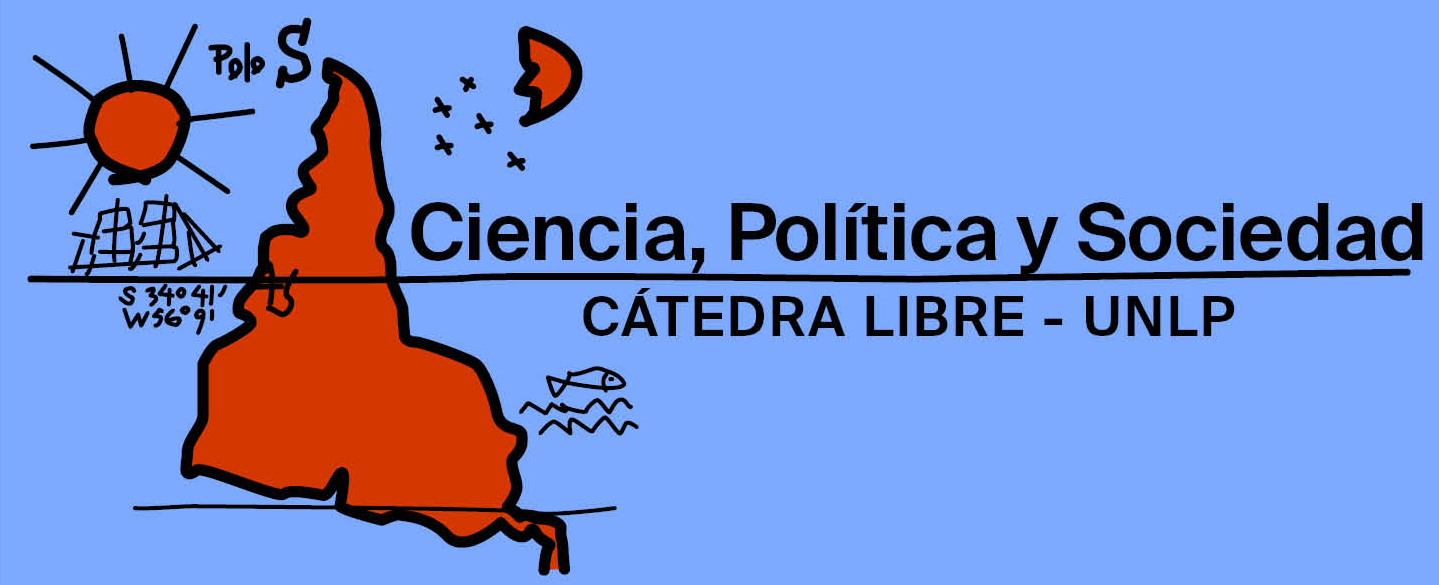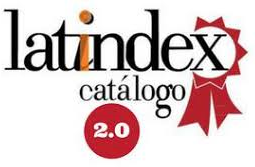About the Journal
Profile of the Journal and Intended Readership
CTyP is a journal produced by the Public Lecture on “Science, Politics and Society: Contributions to Latin American Thought” of the National University of La Plata (UNLP), edited by this university.
This is a journal on Science, Technology and Society (STS) aimed at the scientific and academic community, especially researchers, teachers, professionals who have no expertise in STS issues, administrators, funders of science and technology activities, and other social agents interested in or concerned with these issues. For this reason, the journal deals with political science, information and action, the debates of ideas and the outline of proposals. The journal also aims at restoring the legacy of Latin American Thought as regards Science, Technology and Development (PLACTED). Therefore, it is not thought of as an academic journal where only subject-matter experts can publish, but also researchers from the most diverse fields raising questions regarding the social meaning of their scientific work. The articles published in this journal will have a political viewpoint based on hard information and a thorough understanding of each subject. To this effect, we propose to work with analytical tools developed by PLACTED, its tradition and authors, as well as already developed concepts and research in order to broaden and rethink ideas and concepts addressed by this school of thought.
Main Goals of the CTyP Journal
a) To publish articles that approach each topic with a strict and thorough understanding of STS issues relevant to Latin America in general and Argentina in particular.
b) To participate in both national and international theoretical discussions regarding topics relevant for the study of STS issues.
c) To foster debates within STS politics and management contexts at a local, regional and national level so as to generate inclusive and sovereign projects.
d) Both to get to know and to discuss experiences and production scientific and technological knowledge proposals and use, taking into consideration the different needs of a wide array of different economic (public, private and semi-public companies, work cooperatives and shadow economies), political (political parties, State powers) and social (trade unions, social- and community-based organisations) agents.
Format
The journal is published in digital, open source format through the UNLP Journal Web Portal for mass distribution. It is also printed for its distribution in university, scientific and academic institutions and libraries.
Periodicity
The publication frequency is semiannual. Two issues are published per year in the months of May and November respectively. The May issue covers the first half of the year, while the November issue covers the second half. CTyP accepts article submissions on an ongoing basis. Those texts received until March 1 of each year will be considered for the first issue, while those received until September 1 will be considered for the second issue.
Contents
The CTyP journal will publish original articles which include results of research, reflections, proposals, discussions and experiences related to the aforementioned objectives. The contributions will normally be requested by the Editorial Committee to subject-matter experts, or otherwise spontaneously submitted through the journal website.
The journal reserves the right to accept or reject the aforementioned contributions, in accordance with its thematic scope and in compliance with the editorial policy. The writers of the articles are solely responsible for the opinions voiced in their articles.
The types of contributions to include will be:
• MAIN ARTICLES. They must be unpublished or partially unpublished, and in essence, the product of research with results relevant to the study of Latin American social problems, in particular within the scope of Latin American STS. The articles to be published in this section will be subjected to peer review by the Editorial Committee and a later review from the Academic Committee. The articles may have a maximum length of 24,000 characters with spaces, including the bibliography.
• ARTICLES BY STUDENTS, SCHOLARSHIP HOLDERS AND GRADUATES. This section will feature work performed by the aforementioned, especially those attending undergraduate or graduate courses or seminars offered by the CPS faculty or work performed by PhD or Master’s candidates. For this purpose, authors will be invited to improve their theses to transform them into journal papers, under the direction and supervision of the journal’s Editorial Committee. They may have a maximum length of 20,000 characters with spaces, including the bibliography.
• INTERVIEWS. In this space, prominent figures of the STS environment will be interviewed on topics defined by the Editorial Committee. They may have a maximum length of 16,000 characters with spaces.
• RECOMMENDED AND CLASSICS. This section will comprise a set of texts and readings of general interest to the readers of the CTyP Journal. “Recommended” comprises recently published books and articles, and “Classics” gathers benchmark work from decades past that still hold valid. The members of the Editorial Committee and the Academic Committee shall make proposals to incorporate to this section, as will the readership. The section may eventually expand to include reviews, both for published works and for activities related to the topics of the journal. They may have a maximum length of 4,000 characters with spaces.
• FRAGMENTS. This section will publish parts of articles, books or interviews, particularly of authors related to Latin American Thought in these topics.
Assessment of Contributions
All contributions published in the journal are subject to evaluation by external academic peers, with the exception of the fixed sections (editorial, interview, excerpts, profiles, recommended and classics).
First of all, a pre-evaluation is carried out by the editorial team in order to establish whether the topics covered in the contribution are in line with the scope of the journal and whether it meets the minimum requirements specified in the editorial rules. If it does not fit, the paper will be rejected. Estimated response time: 30 days.
If the paper is within the scope of the journal, an external referee specialiced in the field is chosen to judge the quality of the paper. The system adopted by the journal is single-blind (the anonymity of the referees is preserved). Stipulated time: 30 days.
The criteria followed by the referees in the evaluation are the following: adaptation to CTyP's declared objectives and subject matter in its editorial policy, clarity and relevance of the discourse, adequate internal organisation, quality of the bibliographical references, original contribution or approach in relation to the subject matter, adequate preparation of the abstract, relevance of the title and compliance with the editorial rules.
The possible outcomes of the evaluation are:
- Accepted without changes.
- Accepted subject to modifications (no further peer review).
-
Rejected, offering the author the possibility to modify and resubmit, subject to a new round of peer review.
-
Rejected (the manuscript is returned to the author, together with the peer reviewers' opinions).
When the result is "2" and "3", the manuscript is returned to the author to consider the changes suggested by the referees. The new version must be submitted within 20 days.
The editorial board reserves the right to accept or not the papers, in accordance with the thematic scope and strict compliance with the editorial rules.
Open Access Policy
CTyP promotes and supports the open access movement for knowledge as a common asset, and therefore provides free and immediate access to its contents, issuing its digital format free of charge for authors and readers, operating under the principle that offering the general society unrestricted scientific and academic production contributes to democratisation of knowledge.
Copyright Notice
The authors whose texts are published in this Journal surrender their ownership rights in favour of the editor in a non exclusive manner, i.e. the authors can enter into other independent and additional contracts to publish their text, e.g. including it in an institutional repository, thematic or otherwise, publish it in a book, or others, as long as it is overtly stated that the work was first published in this Journal.
The responsibility for each published paper as regards its content relies exclusively on its authors, holding the editors harmless for any legal liabilities.
The texts of the Journal shall be published under the Creative Commons 4.0 BY-NC-SA license. Therefore, the editors are free to:
1) Share, copy and redistribute the material using any means or format.
2) Adapt, remix, transform and create from the material, under the following conditions:
a) Attribution — credit to this work must be given in an appropriate manner, providing a link to the license and indicating if changes have been made.
b) Non-Commercial Use — no use may be made of the published material for commercial purposes.
c) Share Equal — Authors remixing, transforming or creating from the material must distribute their contribution under the same license as the original.
Ethical Code
The National University of La Plata and the Editorial Committee of CTyP assume a commitment to the scientific quality and ethics of the Journal, supervising the editing and publishing process. The author/s must comply with ethical guidelines and best practices as follows: the author/s must inquire over formal requirements before submitting a manuscript to CTyP and fulfill its requirements, the articles must be original, i.e. the intellectual property must belong only to the author/s who assume all responsibility for its content. They must also be unpublished, i.e. the author/s assume responsibility that the article is unpublished and once submitted to CTyP must not be submitted to further periodicals. Only if the work has been rejected by the Editorial Committee of CTyP may it be sent to another publishing entity.
Privacy Statement
The names and e-mail addresses included in this journal shall be used exclusively for the purposes established in it and will not be provided to third parties or used for purposes other than those mentioned.
Plagiarism Detection
CTyP will work on the identification and sanctioning of cases of plagiarism, in accordance with Law 11723, for which a match detection programme called iThenticate, provided by Crossref, will be used. All manuscripts in which plagiarism is detected shall be rejected for publication, or eliminated if the detection takes place after publication. The author/s must ensure the manuscript is original work and does not contain fragments of documents already published by any other means. The only exception shall be for texts by (an)other author/s between inverted commas and duly cited with their source, a mechanism which shall only be used with the citation is strictly necessary. Therefore, the author/s commit(s) to guaranteeing that the article they send is an unpublished original work and does not infringe third party copyrights.
Preservation Policy
Materials published in this Journal are deposited in SEDICI, the UNLP repository. Automatic backups and remote copies, format adequacies, integrity verification and other activities required to ensure the digital preservation of the documents are performed through the repository. Please refer to the preservation policies of SEDICI at: http://sedici.unlp.edu.ar/pages/politicas#preservacion.
Data Availability Policy
Ciencia, Tecnología y Política promotes transparency and reproducibility of the published research in order for other professionals to reply to the published research described in the articles, either to confirm or refute the results obtained, in accordance with the provisions of National Act No. 26.899 for Open Source Institutional Digital Repositories.
In order to favour result reproducibility, the Journal requires author/s to make available the set of data upon which they have based the research described in the article without restrictions. If there are limitations derived from ethical or legal causes, the author/s shall indicate how other researchers may access these data.
All the research data and information sent to Ciencia, Tecnología y Política will be uploaded and made available through SEDICI, the National University of La Plata repository, in order to enhance compliance with FAIR principles: Findable, Accessible, Interoperable and Reusable.
The author/s are encouraged to deposit their data on SEDICI or any other research data repository (such as FigShare, Mendeley Data or Zenodo) before submitting the contribution to the Journal. Thus, the article can easily refer to the research data by including the URL where it may be accessed.
The author/s is/are requested to use formats that maximise data accessibility and reusability (e.g., if using tables, a spreadsheet is suggested). If necessary, it is recommended to publish the algorithm or pipeline data that must be used for these data for their correct interpretation.
This research data policy was adopted on January 1, 2020 and applies to papers received from that date onwards. Papers published before this date are not subject to the aforementioned policy.
Guidelines for Authors
The manuscripts presented must be fully or partially original and not simultaneously submitted for publication in another journal.
The work must be done with standard word processing software (Microsoft Word, LibreOffice or others) and presented in editable formats (.doc, .docx, .odt).
In the top of their manuscript, the author/s must include the following information in Spanish, English and Portuguese:
-
Title
-
Abstract
-
5 keywords
In addition, the data of the authors must be recorded in the following format:
-
Full name
-
Highest degree
-
Institutional affiliation
- ORCID
-
E-mail
Repeat the data for each of the authors of the paper, and in the case of more than three authors, the collaboration roles of each one must be specified, as specified in this document.
Contributions may be directly uploaded to the delivery system in the journal website or e-mailed to revista.ctyp@presi.unlp.edu.ar
General Text Format
The page size must be A4 with standard margins (1 inch on each side). The text body must be in Arial 12 with 1.5 line spacing.
Footnotes: they must be reduced to the minimum possible, limiting their content to expansions or precisions of matters included in the text. The notes must not be used in place of bibliographic citations, and must be in Arial 10 with single spacing.
The main title must be in Arial 14 Bold. First level subtitles must be in Arial 13 Bold and lower levels, in Arial 12 Bold.
Tables
Tables must be numbered using arabic numerals in the order in which they appear in the text, and include a brief key that describes their content.
Figures and Graphs
Figures and graphs must be incorporated into the text and must also be sent in separate files, in the highest quality possible. They should be self-explanatory (without the need to consult the text to understand them). They must clearly indicate the units and contain the notes and sources used. They must be numbered using arabic numerals and include a brief descriptive key. The format shall be .png, .tiff or .jpeg. The digital edition of the journal may include colour images, although the printed issues will only accept black and white figures.
Citations and Bibliographical References
When the article cites other texts:
-
If the citation is five lines or less, it shall be included between inverted commas and within the same paragraph.
-
If the citation exceeds five lines, it shall be included in a separate indented paragraph, without inverted commas and with single line spacing.
-
Any additions to a citation must be included between square brackets.
Bibliographic citations must be integrated to the body of the article, and full references for all the material cited in the text shall be incorporated at the end of the article. For their correct formatting, it is recommended to consult the following webpage: http://www.normas-apa.org/
Example of reference for books:
Zanetti, S. (2002). La dorada garra de la lectura: Lectoras y lectores de novela en América Latina. Rosario: Beatriz Viterbo.
Reference example for research datasets:
Goñi, Sandro; Mattioli, Nicolás Gabriel; Olivera, Daniela; Salvadori, Viviana, 2024, ‘Measuring food colour in CIELAB space from images’, https://doi.org/10.35537/10915/165649, Universidad Nacional de La Plata, V1.
It is recommended that articles contain no more than twenty bibliographical references.
Complying with this set of guidelines and recommendations is an imperative requirement for publication.
No articles shall be published whose authors fail to adjust them to these guidelines after being accepted.































